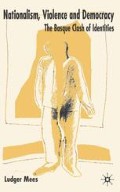Abstract
Since the late 1970s, the processes of transformation, which brought to an end dictatorial regimes and initiated the construction and consolidation of democracy, have become one of the favourite subjects for research among social scientists. Interest in this problem has increased even more since the collapse of the Soviet bloc and the wave of popular mobilization against communism. In the context of this debate, the Spanish example is generally considered a paradigmatic model for the successful and peaceful establishment of a democratic state after a relatively brief period of transition. The process started with the death of the dictator on 20 November 1975, or even some months earlier when the news concerning Franco’s grave illness was known, and it ended with a large consensus backing the new Constitution, as manifested by the Spanish population in the referendum held in December 1978. Thus, in a little more than three years, Spain managed to overcome nearly forty years of dictatorship by carrying out an ‘ideal type of a negotiated transition’, which set the conditions for the following ‘successful and relatively unproblematic consolidation of democracy’.1 In comparison with other successful southern European transitions to democracy (Portugal, Greece), Spain has been ranked highest, ‘since it has been able to resolve problems which were slightly more difficult faster and more efficiently’.2
Access this chapter
Tax calculation will be finalised at checkout
Purchases are for personal use only
Preview
Unable to display preview. Download preview PDF.
Notes
R. Gunther/H.–J. Puhle/P.N. Nikiforos (eds), The Politics of Democratic Consolidation: Southern Europe in Comparative Perspective (Baltimore and London: Johns Hopkins University Press, 1995), p. 4.
This is a translated quotation taken from one of the most recent comprehensive studies on processes of transition and democratic consolidation. See W Merkel and H.–J. Puhle, Von der Diktatur zur Demokratie: Transformationen, Erfolgsbedingungen, Entwicklungspfade (Opladen: Westdeutscher Verlag, 1999), p. 244.
See there also the extensive bibliography (pp. 251–61). More information about the Spanish transition and its comparison with other cases can be found in the following books: R. Gunther/G. Sani/G. Shabad, Spain after Franco: The Making of a Competitive Party System (Berkeley: University of California Press, 1986).
D. Share, The Making of Spanish Democracy (New York: Praeger, 1986).
J. Linz and A. Stepan, Problems of Democratic Transition and Consolidation: Southern Europe, South Africa, and Post–Communist Europe (Baltimore: Johns Hopkins University Press, 1996).
S. P. Huntington, The Third Wave: Democratization in the Late Twentieth Century (Norman: University of Oklahoma Press, 1991).
J. M. Maravall, Regimes, Politics, and Markets. Democratization and Economic Change in Southern and Eastern Europe (Oxford: Oxford University Press, 1997).
J. Tusell and A. Soto (eds), Historia de la transitión 1975–1986, (Madrid: Alianza, 1996).
A. Soto, La transitión a la democ–racia. España 1975–1982 (Madrid: Alianza, 1998).
D. Share and S. Mainwaring, ‘Transition through Transaction: Democratization in Brazil and Spain’, in: W. Selcher (ed.), Political Liberalization in Brazil (Boulder: Westview Press, 1986), pp. 175–215.
The important role of Juan Carlos has been highlighted by different scholars. See e.g. the studies written by Ch. T. Powell, El piloto del cambio: el rey, la monarquía y la transitión a la democracia (Barcelona: Planeta, 1991).
J. Tusell, Juan Carlos I: La restauratión de la monarquía (Madrid: Temas de Hoy, 1995).
For the construction of the ‘state of autonomies’, its origins and current problems see the recent study — with further bibliographical notes — of E. Aja, El Estado Autonómico: Federalismo y hechos diferenciales (Madrid: Alianza, 1999).
This is the thesis of A. Rivera, ‘La transición en el País Vasco: un caso particular’, in: J. Ugarte (ed.), La transitión en el Paíis Vasco y España. Historia y memoria (Bilbao: Universidad del País Vasco, 1998), pp. 79–91.
J. Corcuera, Política y derecho. La construcción de la autonomía vasca (Madrid: Centro de Estudios Constitucionales, 1991), p. 117.
For the evolution of Basque nationalism during the Transition see, besides the book of Corcuera, Política, G. Jáuregui, ‘La cuestión nacional vasca y el Estatuto de Autonomía’, Revista Vasca de Administratión Pública, 1, (1981), pp. 79–109; De Pablo/Mees/Rodríguez Ranz, Péndulo, II, pp. 325–79.
J. P. Fusi and J. Palafox, España: 1808–1996: El desafío de la modernidad, 4th edn (Madrid: 1998), p. 376.
Document reproduced in S. de Pablo/J. L. de la Granja/L. Mees, Documentos para la historia del nacionalismo vasco: De los Fueros a nuestros días (Barcelona: Ariel, 1998), pp. 155–7.
Years later, the communist representative in the constitutional commission, Jordi Solé Tura, considered the exclusion of the PNV as a grave political error. See J. Solé Tura, Nacionalidades y nacionalismos en España: Autonomías, federalismo y autodeterminación, (Madrid: Alianza, 1985).
Results from Catalonia in J. L. de la Granja/P. Anguera/J. G. Beramendi, pp. 214–16; for the Basque Country, see J. Linz et al., Atlas electoral del País Vasco y Navarra (Madrid: Centro de Investigaciones Sociológicas, 1981), pp. 88–93; http://www.euskadi.net.
The complex organizational network of the ‘Liberation Movement’ is studied by J. M. Mata, El nadonalismo vasco radical: Discurso, organizatión y expresiones (Bilbao: Universidad del País Vasco, 1993).
English version of the KAS document in R. P. Clark, Negotiating with ETA: Obstacles to Peace in the Basque Country, 1975–1988 (Reno: University of Nevada Press, 1990), p. 82.
Author information
Authors and Affiliations
Copyright information
© 2003 Ludger Mees
About this chapter
Cite this chapter
Mees, L. (2003). The Transition to Democracy and the Basque Problem. In: Nationalism, Violence and Democracy. Palgrave Macmillan, London. https://doi.org/10.1057/9781403943897_5
Download citation
DOI: https://doi.org/10.1057/9781403943897_5
Publisher Name: Palgrave Macmillan, London
Print ISBN: 978-1-349-50822-8
Online ISBN: 978-1-4039-4389-7
eBook Packages: Palgrave Political & Intern. Studies CollectionPolitical Science and International Studies (R0)

